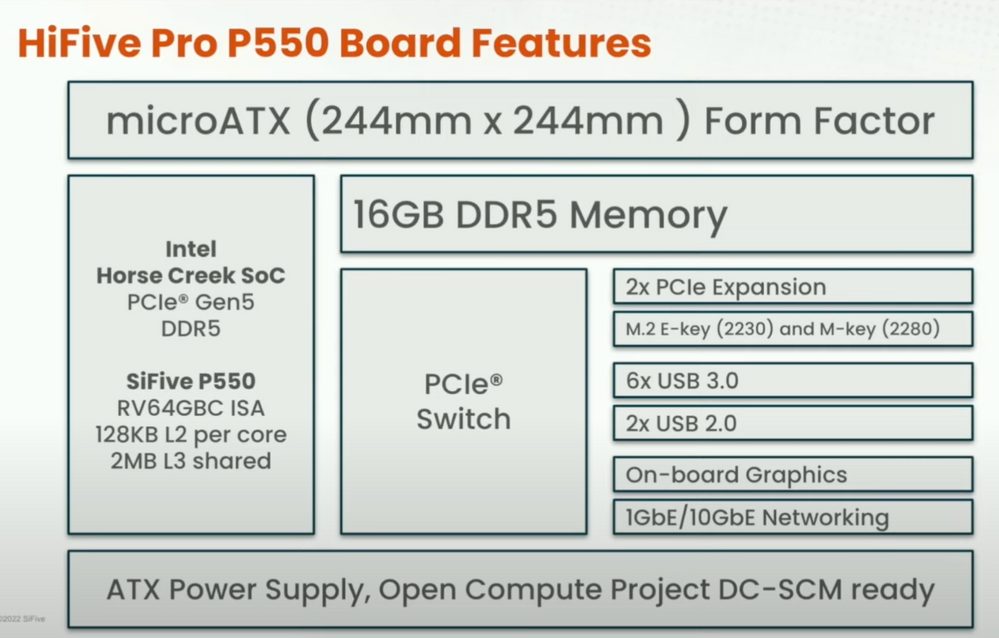SiFive, Intel Announce HiFive Pro P550 MicroATX RISC-V Development Board
According to SiFive and Intel, the HiFive Pro P550 development board will be available this summer.
We are now learning new details on the fruits of the partnership between SiFive and Intel. The two companies have announced that the HiFive Pro P550 development board is on track for release during the summer of 2023.
HiFive Pro P550 is powered by a "Horse Creek" SoC, which is a quad-core, 64-bit RISC-V design. The SoC features private L2 memory, with 128KB allocated to each core, while a total of 2MB L3 cache is shared among all four cores. The SoC operates in excess of 2GHz, according to Intel. Another important thing to remember is that the Pro 550 is built by Intel Foundry Services on the Intel 4 process (aka 7nm in traditional process node parlance).
"When we first looked at this opportunity with RISC-V, our first thought was: Let's put ourselves in the shoes of the developer. What do they need to develop software?" said Nikhil Krishna Gopalakrishna, Principal Engineer at Intel. "The core is fantastic, now let's bring together the most important peripherals around it to enable good ecosystem development."
As for the board itself, it features a microATX form factor (244mm x 244mm) and 16GB of onboard DDR5-5600 memory. Also included are two PCIe 5.0 expansion slots, integrated graphics, 10 GbE, and eight USB ports (two USB 2.0 and six USB 3.0). There are also two M.2 expansion slots (2230 and 2280).

"This is going to push RISC-V software development to new levels, new heights," added Sam Grove, Direct of Product Management at SiFive. "This is really for people building software, packaging software and distributing software to the rest of the ecosystem."
Regarding usage cases, Intel envisions the HiFive Pro P550 development board targeting premium software development, developer desktops, and RISC-V rack systems. However, given that the HiFive Pro P550 is aimed at the developer community, there is no word on pricing for everyday users looking to get their hands on it.
We should note that Intel attempted to acquire SiFive in 2021, but the two companies couldn't agree on financial terms (a reported $2 billion) or how the latter would be integrated into the former. Nevertheless, Intel has been looking for ways to branch out beyond the traditional x86 architecture used in its CPUs, and RISC-V has a lot of potential in low-power applications.
Get Tom's Hardware's best news and in-depth reviews, straight to your inbox.
Looking forward, SiFive's next-generation RISC-V products include the P670 and its low-power companion chip, the P470, aimed at "next-generation wearables and smart consumer devices." The P670 will be built on a 5nm process node and will feature clock speeds of 3.4GHz+.

Brandon Hill is a senior editor at Tom's Hardware. He has written about PC and Mac tech since the late 1990s with bylines at AnandTech, DailyTech, and Hot Hardware. When he is not consuming copious amounts of tech news, he can be found enjoying the NC mountains or the beach with his wife and two sons.
-
JamesJones44 I'm a little surprised by the board type, I would have expected something more like a Raspberry PI than PC motherboard given the low power application target. I guess though if you hope to make it into future laptops this might be a more useful dev board.Reply -
ezst036 I would like to see a day come when you could drop a RISC-V processor into an existing motherboard with a BIOS update, like it was in the Socket 7 days.Reply
An AM4/AM5 or LGA1200/LGA1700 RISC processor. Drop, flash, and go. -
bit_user Reply
The whole point was to make a platform that wouldn't constraint software developers. This is a development vehicle - not an end-user product. It probably won't be cheap, either.JamesJones44 said:I'm a little surprised by the board type, I would have expected something more like a Raspberry PI than PC motherboard given the low power application target. I guess though if you hope to make it into future laptops this might be a more useful dev board.
That being said, I'm pretty impressed by the specs. The weakest thing on that board is definitely the CPU, itself. Still, it's miles better than any RISC-V development board we've had to date. I'm guessing performance will probably be somewhere around that of a Sandbridge i5 desktop. -
bit_user BTW, this looks to be where you can order one: https://www.sifive.com/boards/hifive-pro-p550Reply
They also promise docs, but none are currently available. I'm curious to know what integrated graphics it's using, not that it really matters all that much. -
bit_user Reply
It's a nice idea. AMD did something like that, with the Opteron A1100, which was an 8-core A57 server CPU.ezst036 said:I would like to see a day come when you could drop a RISC-V processor into an existing motherboard with a BIOS update, like it was in the Socket 7 days.
An AM4/AM5 or LGA1200/LGA1700 RISC processor. Drop, flash, and go.
https://www.amd.com/system/files/documents/hierofalcon-product-brief.pdf
I think that's as far as it'll go - within a vendor, you might get socket-compatibility if/when they adopt ARM or RISC-V.